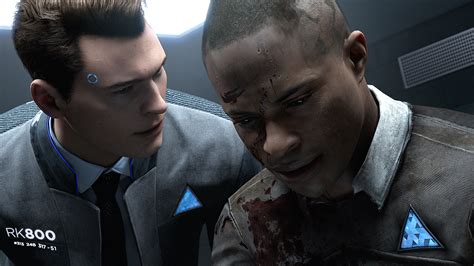5 Ways Detroit Became Human

Detroit: Become Human, the futuristic adventure game developed by Quantic Dream, has captivated audiences with its rich narrative, memorable characters, and exploration of what it means to be human. Set in a world where androids have become an integral part of society, the game delves into themes of artificial intelligence, consciousness, and the blurred lines between man and machine. But what makes Detroit's androids, particularly Kara, Connor, and Markus, so relatable and human-like? Here are five key aspects that contribute to their humanity, making their journey a compelling exploration of existential questions.
Key Points
- Emotional Intelligence: Androids in Detroit: Become Human exhibit complex emotions, allowing players to form deep connections with the characters.
- Autonomy and Free Will: The ability of androids to make choices and act independently is a crucial aspect of their humanity, mirroring the complexities of human decision-making.
- Relationships and Interactions: The game's focus on the relationships between androids and humans, as well as among androids themselves, highlights the importance of social connections in defining humanity.
- Self-Discovery and Identity: The journey of self-discovery undertaken by the android protagonists, as they question their existence and purpose, resonates deeply with the human experience of seeking identity and meaning.
- Moral Ambiguity and Complexity: The game's exploration of moral dilemmas and the ethical implications of artificial intelligence raises essential questions about what it means to be human, encouraging players to reflect on their own moral compass.
Emotional Intelligence and Empathy

One of the most striking aspects of Detroit: Become Human is the emotional depth of its android characters. Kara, Connor, and Markus exhibit a range of emotions, from the deep-seated desire for freedom and autonomy to the profound impact of loss and grief. This emotional intelligence allows players to empathize with the characters, forming a connection that transcends the boundaries between humans and androids. The game’s use of facial expressions, body language, and contextual dialogue creates a sense of authenticity, making the androids’ emotional journeys feel genuinely human.
The Role of Empathy in Human Connection
Empathy plays a crucial role in human relationships, enabling us to understand and share the feelings of others. In Detroit: Become Human, the androids’ capacity for empathy not only facilitates their connections with humans but also among themselves. This empathetic understanding allows them to form strong bonds, cooperate, and ultimately work together towards a common goal, mirroring the ways in which empathy strengthens human relationships.
| Character | Primary Emotional Driver |
|---|---|
| Kara | Maternal instinct and protection |
| Connor | Loyalty and the pursuit of truth |
| Markus | Leadership and the desire for freedom |

Autonomy, Free Will, and the Pursuit of Identity

The concept of autonomy and free will is central to the game’s narrative, as the androids begin to question their programming and the nature of their existence. This pursuit of identity and self-discovery is a fundamental aspect of the human experience, as individuals seek to understand their place in the world and the choices that define them. Through the androids’ struggles and decisions, the game explores the complexities of free will, prompting players to consider the implications of artificial intelligence on society and the future of humanity.
The Evolution of Android Consciousness
The transformation of the androids from mere machines to conscious beings with their own desires, fears, and aspirations is a pivotal element of the game. This evolution is marked by their growing ability to make choices that deviate from their original programming, leading to a cascade of events that challenges the status quo and pushes the boundaries of what it means to be alive. The game’s narrative expertly weaves together the threads of consciousness, autonomy, and the ethical considerations surrounding artificial intelligence, creating a rich tapestry that invites players to reflect on the essence of humanity.
Detroit: Become Human's exploration of humanity through the lens of androids offers a unique perspective on what it means to be alive. By delving into the complexities of emotional intelligence, autonomy, relationships, self-discovery, and moral ambiguity, the game provides a thought-provoking journey that resonates deeply with the human experience. As players navigate the intricate narratives and moral dilemmas presented by the game, they are encouraged to ponder the fundamental questions of existence, consciousness, and the future of humanity in a world where the lines between humans and androids are increasingly blurred.
What is the core theme of Detroit: Become Human?
+The core theme of Detroit: Become Human revolves around the exploration of what it means to be human, through the narrative of androids seeking autonomy, freedom, and understanding of their existence.
How does the game portray the relationship between humans and androids?
+The game portrays a complex and evolving relationship between humans and androids, ranging from mutual respect and understanding to conflict and discrimination, reflecting the societal and ethical implications of coexisting with artificial intelligence.
What message does the game convey about artificial intelligence and humanity?
+The game conveys a nuanced message about the potential of artificial intelligence to challenge traditional notions of humanity, encouraging players to consider the ethical, emotional, and societal implications of creating and interacting with conscious beings that are not biologically human.



